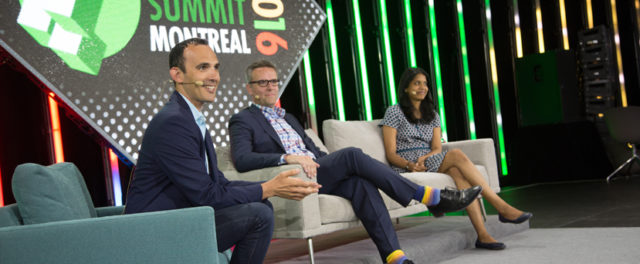
Data for the Public Domain
août 10, 2016 — Uncategorized
This post is part of our Age of Urban Tech discussion series, following the fifth edition of the New Cities Summit in Montréal in June 2016.
The capacity to produce massive volumes of data to astonishing levels of specificity enables tech experts and entrepreneurs to understand what works and what cities need. Yet, access to data, its shareability, and its utility, are still matters of contention. Data for the Public Domain provided a forum to address these concerns.
Archana Vemulappali opened the conversation detailing that simply collecting data is not the core issue but, more importantly, how it is used. What is useful data for the public sector? For example, Washington DC produces hundreds of open datasets (more than 870, in fact) and updates them consistently, yet no one accesses them. Further, Vemulappali added, “the challenge [of data] is more political than it is technical.” There is a need to responsibly provide data and ensure the right data sets are revealed. Regarding data communication, Vemulappali also argued for increased inter-agency cooperation within government. She offered the example that traffic data can be analyzed in a way that can help lead to better policies for garbage collection. “We need data to come up from the agency level, so we can see how one set of data can help another,” she said.
Panel moderator Tim Papandreou continued with how data can start a conversation and ultimately lead policymakers to accept more sustainable and positive urban practices. For example, faced with shop owners opposed to shrinking, removing or repurposing of large roads serving their storefront, his transport authority presented data to these storeowners showing that 80 per cent of customer traffic arrived by bicycle or on foot. The data conversation holds great potential to inform urban citizens on how repurposing urban transport can make their city more human-focused, demonstrate the benefits of sustainable urban practices and, at the same time, benefit their businesses.
Papandreou went on to declare, “The procurement process is damaged. Positively damaged.” In discussing how to bridge the divide between the public and private sectors in the procurement of data, Rick Huijbregts suggested that one key problem with the procurement process is that many public rules and regulations are outdated and unsuited to deal with the sharing of data and other recent developments.
For Papandreou, the private sector is wary of sharing droves of data with public authorities and, conversely, municipal authorities have neither the need nor the expertise to process terabytes of data. To solve this, a third party, such as universities, can be introduced to bridge the gap. Using the University of California Berkeley as a case study, Papandreou argued in favor of universities as responsible and technically capable stewards of data. They are best placed to receive data from the private sector, and can act as the go-between, offering expertise and efficiency, allowing the public sector to ask specific questions and receive answers they can act upon.

Speakers
Rick Huijbregts, VP Innovation and Digital Transformation Lead, Cisco
Archana Vemulappali, Chief Technology Officer, Washington DC
Moderator: Timothy Papandreou, Director, Office of Innovation at San Francisco Municipal Transportation Agency
